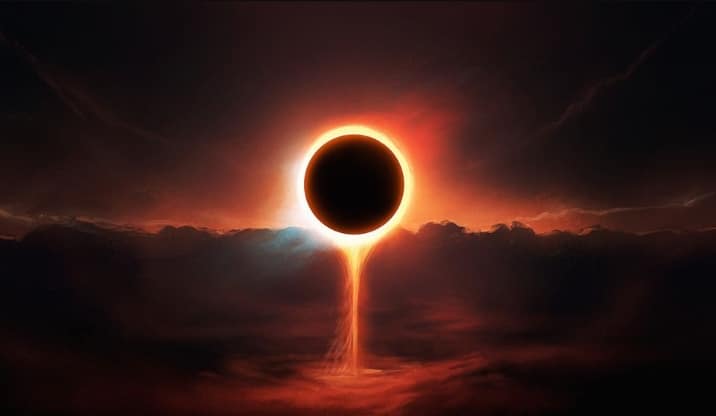Pakistan’s astronomy lovers will be disappointed to learn that they will miss out on witnessing some of the most spectacular celestial events in 2025. According to the latest reports, two solar eclipses and two lunar eclipses are set to occur in the upcoming year, but only one lunar eclipse will be visible from Pakistan.
While skywatchers across different parts of the world will have the opportunity to observe these awe-inspiring astronomical phenomena, Pakistanis will have to wait for future celestial occurrences to experience such marvels firsthand.
A lunar eclipse occurs when the Earth comes between the Sun and the Moon, casting a shadow on the lunar surface. In 2025, two significant lunar eclipses will take place:
First Lunar Eclipse – March 14, 2025
- Time of occurrence: Begins at 8:57 AM (Pakistan Standard Time)
- Visibility in Pakistan: Not visible
- Regions where visible: Parts of North America, South America, and Western Europe
Unfortunately, this eclipse will not be visible from Pakistan, as it will occur during daylight hours, rendering it impossible for observers in the country to witness the event.
Second Lunar Eclipse – September 7–8, 2025
- Time of occurrence: Begins at 8:28 PM and ends at 1:55 AM (Pakistan Standard Time)
- Visibility in Pakistan: Visible
- Regions where visible: Asia, Europe, Africa, and parts of South America
Pakistani skywatchers will have an opportunity to witness this celestial event in its entirety. As the Moon passes through the Earth’s shadow, it may take on a reddish hue, often referred to as a “Blood Moon.” This stunning phenomenon is caused by the scattering of sunlight through the Earth’s atmosphere.
Solar Eclipses in 2025
Solar eclipses occur when the Moon moves between the Earth and the Sun, temporarily obscuring the Sun’s light. Two solar eclipses are set to take place in 2025, but neither will be visible in Pakistan.
First Solar Eclipse – March 29, 2025
- Type of eclipse: Total Solar Eclipse
- Visibility in Pakistan: Not visible
- Regions where visible: North America, parts of the Atlantic Ocean, and Europe
This total solar eclipse will be an extraordinary sight for those in the path of totality, offering a rare moment when the Sun is completely covered by the Moon, casting darkness in the middle of the day.
Second Solar Eclipse – September 21–22, 2025
- Type of eclipse: Partial Solar Eclipse
- Visibility in Pakistan: Not visible
- Regions where visible: North America, Europe, and parts of the Arctic
Once again, Pakistanis will miss out on this celestial event, as the eclipse will occur in regions outside of South Asia.
Why Are These Eclipses Not Visible in Pakistan?
The visibility of an eclipse depends on the alignment of the Sun, Moon, and Earth as well as the observer’s geographical location. The March 14 lunar eclipse will happen during daylight hours in Pakistan, making it impossible to see. Similarly, the March 29 and September 21–22 solar eclipses will occur in parts of the world that are beyond Pakistan’s horizon.
Only the September 7–8 lunar eclipse will be visible in Pakistan, as it occurs at night when the Moon is above the horizon.
While 2025 may not be the best year for eclipse watchers in Pakistan, other celestial events will still be worth observing. Meteor showers, planetary alignments, and supermoons are just a few of the phenomena that will be visible throughout the year.
- Lyrids Meteor Shower (April 22–23, 2025): Expect up to 20 meteors per hour.
- Perseids Meteor Shower (August 12–13, 2025): One of the most spectacular showers with up to 100 meteors per hour.
- Geminids Meteor Shower (December 13–14, 2025): Another highly active meteor shower, producing bright shooting stars.
Supermoons in 2025
- May 5, 2025
- October 17, 2025
A supermoon occurs when the Moon is at its closest point to Earth, making it appear larger and brighter than usual.

How to Experience Celestial Events in Pakistan
For astronomy enthusiasts in Pakistan, joining a local observatory or astronomy club can enhance the experience of stargazing. Some of the best places for dark-sky observations include:
- Skardu and Hunza – Low light pollution, clear skies
- Ranikot Fort, Sindh – Great visibility for meteor showers
- Gorakh Hill Station, Sindh – High elevation for a perfect stargazing experience
Using telescopes and binoculars, as well as skywatching apps, can help enthusiasts track upcoming astronomical events.


